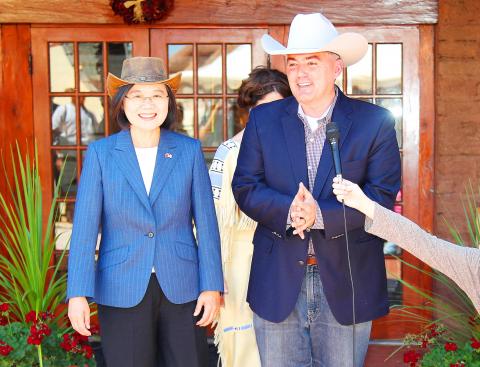Next year’s presidential election is a choice between value systems and ways of life, and the sustainability of democracy and freedom, President Tsai Ing-wen (蔡英文) said on Saturday.
After concluding a state visit to the nation’s four Caribbean allies on Friday, Tsai made a two-night stopover in Denver, Colorado, on her way home and held an informal meeting with reporters accompanying her delegation.
Commenting on foreign media reports that next year’s presidential and legislative elections would be a battle between pro-China and pro-US camps, Tsai said she sees the elections as “a choice between value systems and ways of life.”

Photo: CNA
Taiwan is a democratic society and its voters are focused on the nation’s future, especially whether its democratic way of life and freedom can be sustained, said Tsai, of the Democratic Progressive Party (DPP), who is running for re-election.
“We hope for peace and stability when handling cross-strait relations, we also hope that China will understand the hopes and priorities of Taiwanese that are expressed in each general election,” she added.
Asked about possible presidential challenges by the pro-independence Formosa Alliance or by Taipei Mayor Ko Wen-je (柯文哲), Tsai said that she aims to forge a coalition of supporters of Taiwan and the Republic of China.
The Formosa Alliance has organized itself into a political party, but has yet to nominate a presidential candidate. Ko has said he would announce next month whether he would run for president.
Regarding a running mate, Tsai said that the political situation is still developing and the DPP would hold a discussion later.
“Our objective remains to create the best and most competitive ticket for 2020,” she added.
During her trip to the Caribbean, interacting with local people and witnessing Taiwan’s assistance to its allies, such as helping Saint Lucia eradicate a disease that damaged banana crops, moved her, Tsai said.
American Institute in Taiwan Chairman James Moriarty also attended Tsai’s meeting with the press, and she thanked the US government for helping on her Caribbean trip.
Asked if she thought Taiwan would become a bargaining chip in US President Donald Trump’s re-election campaign next year or in US-China trade negotiations, Tsai said she would not comment on US domestic politics.
However, she believes Taiwan has the support of Americans and US political parties, she said.
Taiwan should have its own strategies and ideas based on its interests, and continue its cooperation and positive relations with the US, Tsai said.
Tsai on Saturday also visited the US National Center for Atmospheric Research in Boulder, Colorado.
She was welcomed by center director Everette Joseph, a group of Taiwanese scientists working at the facility and Taiwanese students in the area.
The center and Taiwanese scientists developed Formosat-7, the second satellite constellation jointly built by Taiwan and the US after Formosat-3.
She visited the Earth Observing Laboratory, one of the center’s seven laboratories, where she was given a tour of research aircraft.
Tsai later had lunch with US Senator Cory Gardner, who represents Colorado.
She is scheduled to arrive home today.

The CIA has a message for Chinese government officials worried about their place in Chinese President Xi Jinping’s (習近平) government: Come work with us. The agency released two Mandarin-language videos on social media on Thursday inviting disgruntled officials to contact the CIA. The recruitment videos posted on YouTube and X racked up more than 5 million views combined in their first day. The outreach comes as CIA Director John Ratcliffe has vowed to boost the agency’s use of intelligence from human sources and its focus on China, which has recently targeted US officials with its own espionage operations. The videos are “aimed at

STEADFAST FRIEND: The bills encourage increased Taiwan-US engagement and address China’s distortion of UN Resolution 2758 to isolate Taiwan internationally The Presidential Office yesterday thanked the US House of Representatives for unanimously passing two Taiwan-related bills highlighting its solid support for Taiwan’s democracy and global participation, and for deepening bilateral relations. One of the bills, the Taiwan Assurance Implementation Act, requires the US Department of State to periodically review its guidelines for engagement with Taiwan, and report to the US Congress on the guidelines and plans to lift self-imposed limitations on US-Taiwan engagement. The other bill is the Taiwan International Solidarity Act, which clarifies that UN Resolution 2758 does not address the issue of the representation of Taiwan or its people in

US Indo-Pacific Commander Admiral Samuel Paparo on Friday expressed concern over the rate at which China is diversifying its military exercises, the Financial Times (FT) reported on Saturday. “The rates of change on the depth and breadth of their exercises is the one non-linear effect that I’ve seen in the last year that wakes me up at night or keeps me up at night,” Paparo was quoted by FT as saying while attending the annual Sedona Forum at the McCain Institute in Arizona. Paparo also expressed concern over the speed with which China was expanding its military. While the US

SHIFT: Taiwan’s better-than-expected first-quarter GDP and signs of weakness in the US have driven global capital back to emerging markets, the central bank head said The central bank yesterday blamed market speculation for the steep rise in the local currency, and urged exporters and financial institutions to stay calm and stop panic sell-offs to avoid hurting their own profitability. The nation’s top monetary policymaker said that it would step in, if necessary, to maintain order and stability in the foreign exchange market. The remarks came as the NT dollar yesterday closed up NT$0.919 to NT$30.145 against the US dollar in Taipei trading, after rising as high as NT$29.59 in intraday trading. The local currency has surged 5.85 percent against the greenback over the past two sessions, central